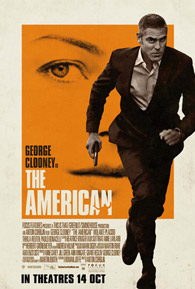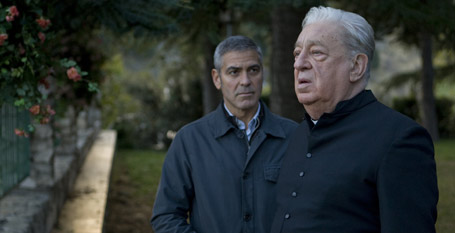
Earlier this year when I reviewed the superb Hong Kong thriller The Stool Pigeon, I described it as such:
“There are footchases and car chases, all without superhuman stunts, remarkably enjoyable and easy to follow. There are suspenseful hair-breadth escapes and evasions, all executed with the precise timing of a Swiss watch. The spatial relationships between characters and action are superbly established in these scenes, and lend an especial air of credibility to the film’s action sequences, which are not self-contained setpieces that draw attention to themselves but function as extensions of the film’s plot and are firmly rooted in character development.”
The above paragraph in its entirety can be used just as well to describe Anton Corbijn’s The American, a rare Hollywood thriller that combines the elegant genre exercise of a Johnnie To or a Dante Lam with the deadpan romantic existentialism of Jean-Pierre Melville’s classic Le Samourai. Which helps to make up for the fact that much of its script is really lots of gesturing and reminding you of better films. In addition to the nod to Le Samourai, this reviewer also picked out nods to Rififi and The Talented Mr Ripley.
George Clooney plays one of those movie assassins that’s always so oh-so cool, oh-so samurai-like in his devotion, and oh-so lonely because of it. In addition to that, he also makes customized weapons on the side. Like Alain Delon’s character in Le Samourai, he is merely an outline to the point of abstraction, his body, aging but still reasonably cut, showing him in a stark profile. So obscure is he, we never learn if his real name is Jack or Edward, in fact, what remains far more consistent is his nickname, Mr Butterfly (“Farfalla”). Mr Butterly works for Pavel, one of those pan-European accented, pasty-skinned types that manifest films like these, who orders him to head for Italy.
Americans in movies head for Mediterranean Catholic Europe to find romantic fulfilment and discover the art of good living, following a literary tradition stretching back to Henry James. Not even cold-blooded criminals are apparently exempt from this rule. Once in Italy, Mr Butterfly meets up with the beautiful fellow assassin Mathilde. His mission is to design a customized weapon with the “firing capacity of a submachine gun and the range of a sniper rifle” for Mathilde to make her important kill. All goes well until Mr Butterly flouts the usual barrier of the honour code of every single solitary coldblooded criminal type in the movies: he falls in love. This time with the beautiful Italian streetwalker Clara (Violante Placido), in whose bed and whose curvaceous body he finds his comfort and solace. Just as Clara provides Mr Butterfly with a measure of comfort and solace for his weary soul, it is in the questioning eyes of an Italian Padre, Benedetto (Paolo Bonacelli), who does not take long to recognize the depths of his guilt and sin.
The conspiracy that Mr Butterfly uncovers in the course of the film hardly makes any conventional sense or logic, and one wonders why the villain goes through such pains to orchestrate a plan that does not seem to have too big a chance of success to begin with. That is much beside the film’s point. Such thrillers, rooted in the classic Film Noir tradition, are basically not so much as about what characters are doing as much as what characters are being. And it is in the quieter, finer moments of the film that it gets behind its characters’ eyes to reveal the subtle transformations that take place within their minds, as well as how they relate to each other. Cinematographer Martin Ruhe creates an Italian landscape that is both stark and enchanting, a travelogue photoshoot where menacing shadows coil in the shade.
Following his cult film Control, veteran photographer and music video director Anton Corbijn aims for and delivers an elegant and fine-tuned genre exercise that is a breath of fresh air from most big-budget Hollywood action films.

